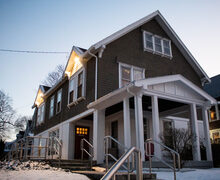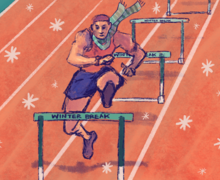SU students are creating a proposal to redraw NYS congressional districts
Corey Henry | Senior Staff Photographer
MAX 300 students will propose how to redraw New York state's congressional districts, possibly submitting their proposal to New York Law School.
Get the latest Syracuse news delivered right to your inbox.
Subscribe to our newsletter here.
This semester, 11 students will create a proposal on how to redraw New York state’s congressional districts, possibly reshaping state politics for the next decade.
The class, MAX 300 in Syracuse University’s Maxwell School of Citizenship and Public Affairs, has never been offered at SU before this semester. It is one of many student-run groups across the state who will compete to have their proposal submitted to the New York Law School.
The class meets every other week and is led by Timur Hammond, an assistant professor in the department of geography and the environment.
“Redistricting is something I am certainly not an expert in, but something I have a professional interest in as well as a personal interest in as someone who lives in a democracy,” Hammond said.
Redistricting is something I am certainly not an expert in. But something I have a professional interest in as well as a personal interest in as someone who lives in a democracy.Timur Hammond, assistant professor in the department of geography
Every 10 years, house seats are redistributed to states based on the results of the national census. While redistricting can sound like a straightforward process, the power to redraw districts in a state has become more controversial over the past 30 years, Hammond said.
Gerrymandering is when a party manipulates an electoral constituency’s boundaries so that as many winnable seats as possible go to that party.
Hammond, who leads the group of students every other week on Zoom, says the process is moving quickly and efficiently, with a focus on getting the best plan possible submitted before the Jan.15, 2022 deadline.
“The primary focus of our conversations has been learning how to use the software programs and web-based redistricting tools that let you create congressional districts,” Hammond said. “You basically get to color in the map to see how you can fit populations together.”
Students have come into the class with varying expertise in the redistricting process.
“We have some students who will get together on weekends with their friends on Zoom and actually draw electoral districts in their spare time, and we have students who came to this with very little background. So we are trying to learn by doing,” Hammond said.
Otto Sutton, a sophomore in Maxwell who is triple majoring in political science, history, and political philosophy, said the class has been discussing the complications with redrawing the districts in New York state.
“We talk a lot about how to best represent the electorate. In New York, you have really populated cities and also these large swaths of rural areas like where I am from. So what’s the right balance in that?” Sutton said. “Is it putting cities together by themselves or balancing the district with a city and a large rural area? So it’s a bit challenging.”
Once the proposal has been submitted to the New York Law School, it will compete with other student-made proposals, Hammond said. The winning proposal will be submitted to the New York Independent Redistricting Commission.
The bipartisan commission will formally propose the new map and submit it to the Democratic-led state legislature by Jan. 15, 2022.
“It only comes around every 10 years. So it really is a really unique opportunity we have here, and we are extremely lucky to have someone like Professor Hammond, who is just extremely enthusiastic in learning the process like we are,” Sutton said. “It really is a cool experience. It’s a really unique process, and it’s really exciting to learn about it.”
Published on October 19, 2021 at 11:17 pm
Contact Quinn at: jqvanant@syr.edu






